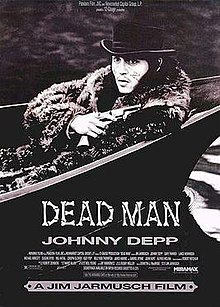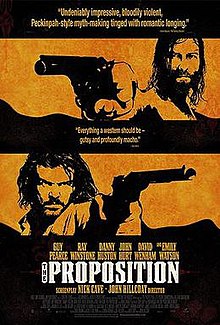EPISODE 1813
COWBOYS AND OUTLAWS: PAINT YOUR WAGON
Dead Man (1995)
The Proposition (2005)
Il Buono, il Brutto, il Cattivo (1966)
| The Good, the Bad and the Ugly | |
|---|---|

Italian theatrical release poster
| |
| Directed by | Sergio Leone |
| Produced by | Alberto Grimaldi |
| Screenplay by |
|
| Story by |
|
| Starring | |
| Music by | Ennio Morricone |
| Cinematography | Tonino Delli Colli |
| Edited by |
|
Production
companies | |
| Distributed by | Produzioni Europee Associate |
Release date
|
|
Running time
| 177 minutes |
| Country | Italy[1][2][4][5] |
| Language |
|
| Budget | US$1.2 million[6] |
| Box office | US$25.1 million (North America)[7] |
The trio[edit]
- Clint Eastwood as "Blondie" (a.k.a. the Man with No Name): The Good, a subdued, confident bounty hunter who teams up with Tuco, and Angel Eyes temporarily, to find the buried gold. Blondie and Tuco have an ambivalent partnership. Tuco knows the name of the cemetery where the gold is hidden, but Blondie knows the name of the grave where it is buried, forcing them to work together to find the treasure. In spite of this greedy quest, Blondie's pity for the dying soldiers in the chaotic carnage of the War is evident. "I've never seen so many men wasted so badly," he remarks. He also comforts a dying soldier by laying his coat over him and letting him smoke his cigar. Rawhide had ended its run as a series in 1966, and at that point neither A Fistful of Dollars nor For a Few Dollars More had been released in the United States. When Leone offered Clint Eastwood a role in his next movie, it was the only big film offer he had; however, Eastwood still needed to be convinced to do it. Leone and his wife traveled to California to persuade him. Two days later, he agreed to make the film upon being paid $250,000[12] and getting 10% of the profits from the North American markets—a deal with which Leone was not happy.[13] In the original Italian script for the film, he is named "Joe" (his nickname in A Fistful of Dollars), but is referred to as Blondie in the Italian and English dialogue.[9]
- Lee Van Cleef as Angel Eyes: The Bad, a ruthless, unfeeling, and sociopathic mercenary who always finishes a job he is paid for (which is usually finding—and killing—people). When Blondie and Tuco are captured while posing as Confederate soldiers, Angel Eyes is the Union sergeant who interrogates and has Tuco tortured, eventually learning the name of the cemetery where the gold is buried, but not the name on the tombstone. Angel Eyes forms a fleeting partnership with Blondie, but Tuco and Blondie turn on Angel Eyes when they get their chance. Originally, Leone wanted Enrico Maria Salerno (who had dubbed Eastwood's voice for the Italian versions of the Dollars Trilogy films)[14] or Charles Bronson to play Angel Eyes, but the latter was already committed to playing in The Dirty Dozen (1967). Leone thought about working with Lee Van Cleef again: "I said to myself that Van Cleef had first played a romantic character in For a Few Dollars More. The idea of getting him to play a character who was the opposite of that began to appeal to me."[15] In the original working script, Angel Eyes was named "Banjo", but is referred to as "Sentenza" (meaning "Sentence" or "Judgement") in the Italian version. Eastwood came up with the name Angel Eyes on the set, for his gaunt appearance and expert marksmanship.[9]
- Eli Wallach as Tuco Benedicto Pacífico Juan María Ramírez (known as "The Rat" according to Blondie): The Ugly, a comical and oafish but cagey and resilient, fast-talking Mexican bandit who is wanted by the authorities for a long list of crimes. Tuco manages to discover the name of the cemetery where the gold is buried, but he does not know the name of the grave. This state of affairs forces Tuco to become reluctant partners with Blondie. The director originally considered Gian Maria Volontè for the role of Tuco, but felt that the role required someone with "natural comic talent". In the end, Leone chose Eli Wallach, based on his role in How the West Was Won (1962), in particular, his performance in "The Railroads" scene.[15] In Los Angeles, Leone met Wallach, who was skeptical about playing this type of character again, but after Leone screened the opening credit sequence from For a Few Dollars More, Wallach said: "When do you want me?"[15] The two men got along famously, sharing the same bizarre sense of humor. Leone allowed Wallach to make changes to his character in terms of his outfit and recurring gestures. Both Eastwood and Van Cleef realized that the character of Tuco was close to Leone's heart, and the director and Wallach became good friends. They communicated in French, which Wallach spoke badly and Leone spoke well. Van Cleef observed, "Tuco is the only one of the trio the audience gets to know all about. We meet his brother and find out where he came from and why he became a bandit. But Clint's and Lee's characters remain mysteries."[15] In the theatrical trailer, Angel Eyes is referred to as The Ugly and Tuco, The Bad.[16] This is due to a translation error; the original Italian title translates to "The Good [one], the Ugly [one], the Bad [one]".
Supporting cast[edit]
- Aldo Giuffrè as Captain Clinton
- Mario Brega as Corporal Wallace
- Luigi Pistilli as Father Pablo Ramírez
- Al Mulock as Elam
- Antonio Casas as Stevens
- Antonio Casale as Bill Carson/Jackson
- Antonio Molino Rojo as Captain Harper
- Rada Rassimov as Maria
- Enzo Petito as Storekeeper
- Chelo Alonso as Stevens' Wife
| Dead Man | |
|---|---|

Theatrical release poster
| |
| Directed by | Jim Jarmusch |
| Produced by | Demetra J. MacBride |
| Written by | Jim Jarmusch |
| Starring | |
| Music by | Neil Young |
| Cinematography | Robby Müller |
| Edited by | Jay Rabinowitz |
| Distributed by | Miramax Films |
Release date
|
|
Running time
| 120 minutes[1] |
| Country | United States |
| Language | English |
| Budget | $9 million[2] |
| Box office | $1,037,847[3] |
- Johnny Depp as William Blake, a meek accountant from Cleveland, Ohio
- Gary Farmer as Nobody, a strong and opinionated Native American who was forcibly raised by whites and later given the mocking name "He Who Talks Loud, Saying Nothing" or Exaybachay by fellow natives
- Crispin Glover as Train Fireman, a coal-covered boilerman who welcomes Blake to the "hell" of Machine
- Robert Mitchum as John Dickinson, a shotgun-toting industrialist in Machine (Mitchum's final film role before his death in 1997)
- John Hurt as John Scholfield, the business manager of Dickinson's factory
- Mili Avital as Thel Russell, a former prostitute who makes and sells paper flowers
- Gabriel Byrne as Charlie Dickinson, Thel's ex-boyfriend and John Dickinson's son
- Lance Henriksen as Cole Wilson, an infamous bounty hunter and murderous cannibal
- Michael Wincott as Conway Twill, a talkative bounty hunter
- Eugene Byrd as Johnny "The Kid" Pickett, a young bounty hunter
- Iggy Pop as Salvatore "Sally" Jenko, a cross-dressing, Bible-reading fur trader at a campsite
- Billy Bob Thornton as Big George Drakoulious, a mountain man at Sally's campsite
- Jared Harris as Benmont Tench, a knife-toting fur trader at Sally's campsite
- Alfred Molina as Trading Post Missionary, a corrupt missionary and businessman
- Gibby Haynes as Man with gun in alley
- Michelle Thrush as Nobody's girlfriend
Critical responses were mixed to positive. Roger Ebert gave the film one-and-a-half stars (out of four stars maximum), noting "Jim Jarmusch is trying to get at something here, and I don't have a clue what it is".[11] Desson Howe and Rita Kempley, both writing for the Washington Post, offered largely negative appraisals.[12] Greil Marcus, however, mounted a spirited defense of the film, titling his review "Dead Again: Here are 10 reasons why 'Dead Man' is the best movie of the end of the 20th century."[13] Film critic Jonathan Rosenbaum dubbed the film an acid western, calling it "as exciting and as important as any new American movie I've seen in the 90s"[14] and went on to write a book on the film, entitled Dead Man (ISBN 0-85170-806-4) published by the British Film Institute. The film has a 'Fresh' 69% rating on website Rotten Tomatoes based on 49 reviews.
| The Proposition | |
|---|---|

Promotional poster for The Proposition
| |
| Directed by | John Hillcoat |
| Produced by | Chris Brown Chiara Menage Jackie O'Sullivan Cat Villiers |
| Written by | Nick Cave |
| Starring | Guy Pearce Ray Winstone Emily Watson Danny Huston David Wenham John Hurt |
| Music by | Nick Cave Warren Ellis |
| Cinematography | Benoît Delhomme |
| Edited by | Jon Gregory |
| Distributed by | First Look Pictures |
Release date
| 6 October 2005 |
Running time
| 104 minutes |
| Country | Australia United Kingdom |
| Language | English |
| Budget | $2 million[1] |
| Box office | $5 million[2] |
- Guy Pearce as Charlie Burns
- Ray Winstone as Captain Morris Stanley
- Emily Watson as Martha Stanley
- Danny Huston as Arthur Burns
- David Wenham as Eden Fletcher
- Richard Wilson as Mike Burns
- John Hurt as Jellon Lamb
- Tom E. Lewis as Two Bob
- Leah Purcell as Queenie
- Tom Budge as Samuel Stoat
- David Gulpillil as Jacko
- Noah Taylor as Brian O'Leary
- Mick Roughan as Mad Jack Bradshaw
- Shane Watt as John Gordon
- Rodney Boschman as Tobey
At the Movies critic Margaret Pomeranz called it an "extraordinary film [that] explores the elliptical nature of class, race, colonisation and family. … All the performances are strong but once again Guy Pearce brings a strange power to Charlie and Ray Winstone is truly fine as Stanley. And Danny Huston is oddly perfect as Arthur. It’s a strange, unsettling film, ultimately quite moving, it’s impossible not to respond to it strongly. It’s not an easy access film. It’s violent and the motivation of the characters is sometimes oblique."[7]
Co-host David Stratton thought that The Proposition was "a fascinating depiction of the outback in this period, and I've never seen an Australian film which told what is basically a bushranging story in such an unusual way. So, it has a lot of originality there. And it has fine performances. I thought Danny Huston was extraordinary, actually. He's an actor I usually don't respond to, but I thought he was excellent in this role. So, there's a lot of intriguing elements to this film, but I did find the violence almost unwatchable."[8]

Comments
Post a Comment